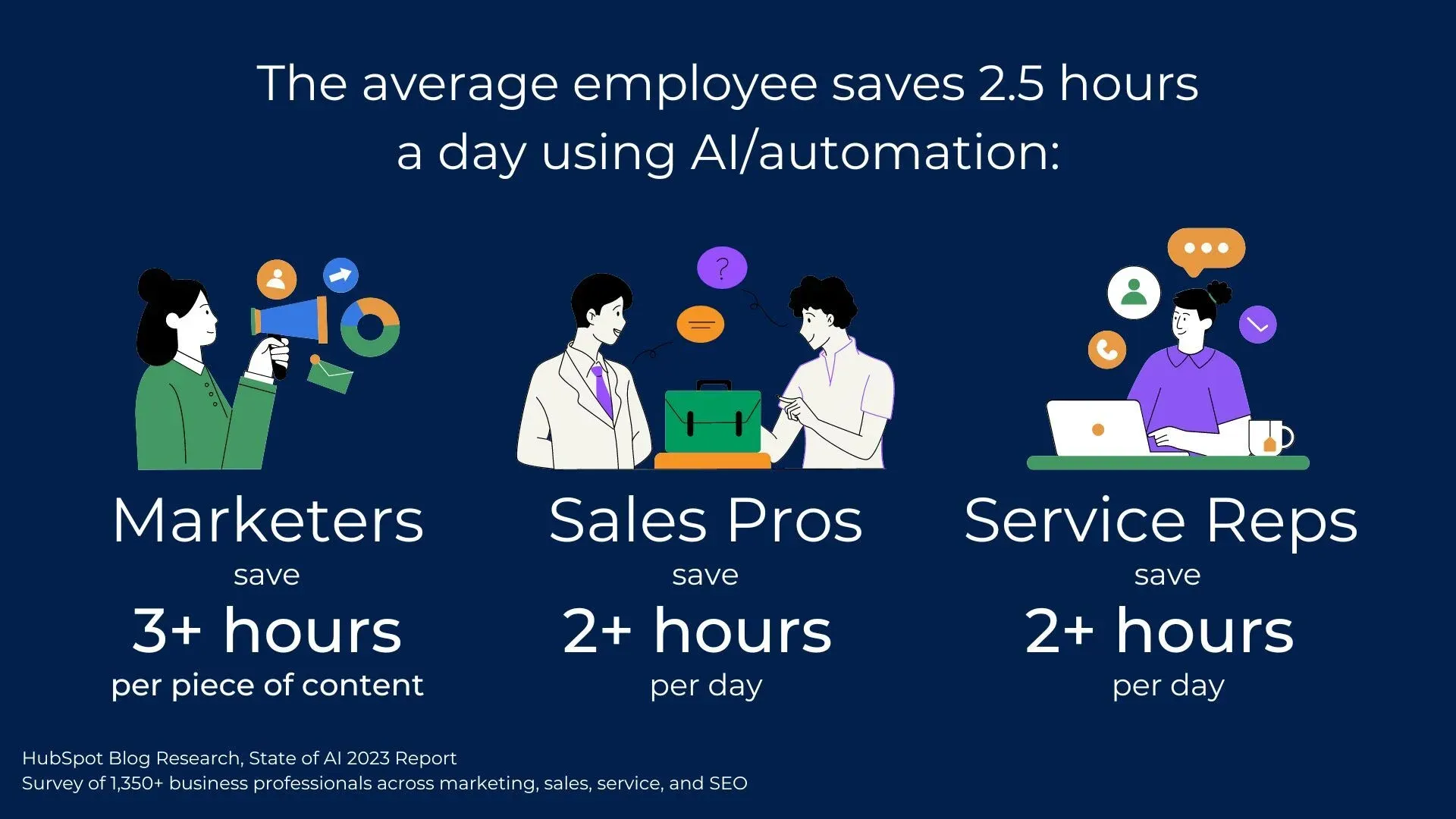Will Sales Jobs Be Replaced By AI?
The rise of Ai tools such as ChatGPT and Bard have left many sales reps wondering will sales jobs be replaced by ai? or how will ai affect sales jobs?

The world of sales is changing at a rapid pace thanks to generative AI tools like ChatGPT and Bard.
This has stirred questions and concerns among the sales community: "Will sales jobs be replaced by AI?" and "How will AI affect sales jobs"
Sam Altman the CEO of OpenAi, the creators of ChatGPT even said:
AI Will Replace Customer Service Jobs First
These questions aren't just speculative, but are rooted in shifts between buyers and sellers across both B2B and B2C industries.
Lets take a closer look:
The Current State of AI in Sales
One of the most common use cases for generative AI is sales.
Some examples of AI currently being used in sales include chatbots, predictive analytics, and lead scoring.
Chatbots use natural language processing to communicate with customers and answer their questions.
Predictive analytics uses machine learning algorithms to analyze customer data and predict their behavior.
Lead scoring is using AI to rank potential customers based on their likelihood to convert, helping sales teams prioritize their efforts.
The advantages of AI in these areas is increased efficiency, improved accuracy, and better customer service. AI is streamlining processes that typically take hours or day to minutes and offering insights that were previously unattainable.
On the flip side, there are also limitations to AI. This includes the inability to understand emotional intelligence and the potential for bias in decision-making.
As the technology continues to evolve, it's already showcasing a blend of automation and human intelligence. This will reshape the way sales operations are being conducted.

AI Sales Features Today
Major players in the field like Gong and Outreach already implementing AI features into their products.
Take a look at the surge of AI feature releases:
- LeadiQ - Scribe - Automated Outreach: Offers automated outreach capabilities, powered by AI, to streamline the prospecting process.
- Clari - RevGPT: Clari has introduced RevGPT, which uses that uses ChatGPT to give companies the ability to get answers to their most critical revenue questions and take action with speed and precision.
- Gong - Proprietary generative AI models Utilizing Gong’s dataset of tens of billions of captured and analyzed sales interactions – including calls, emails, and web conferences, etc to produce highly accurate and relevant content.
- Outreach - Smart Email Assist: a new feature integrating generative AI technology into the Outreach Sales Execution Platform.
- ZoomInfo - Chorus - ZoomInfo’s conversation intelligence platform, use generative AI to provide users with easily digestible and comprehensive post-meeting summaries.
- HubSpot - Content Assistant and ChatSpot - Build on HubSpot’s ecosystem including conversation intelligence, data quality tooling, data enrichment, predictive AI, content optimization, etc.
- Salesforce - Einstein GPT - integrates with OpenAI to provide Salesforce customers with out-of-the-box generative AI capabilities.
And this is just small parts of larger features for all of these companies.
AI Startups such as Customers.ai, Lavender and Immersive Fox have all raised millions of dollars over the past year.
Tasks AI Can Handle Efficiently
First let's take a look at what AI can do well.
AI can take on tasks in the sales that are repetitive and data-intensive.
Top Highlights:
- Automating administrative and time-consuming tasks for sales representatives saves time and boosts productivity by at least 27%
- Firms using AI for sales saw more than a 60% -70% reduction in their call time.
Source: G2
Routine tasks: The number one area for AI shine is routine tasks. Reps spend countless hours updating CRM data. AI tools can optimize the traditionally labor-intensive task of data entry by automatically filling in fields with information. This not only minimizes human mistakes but also freeing up sales reps' time.
Customer service: The world of customer service has been changed thanks to the introduction of chatbots. These AI-driven virtual assistants can handle a wide range of frequently asked questions (FAQs), providing instant responses to customer queries. Not only do they offer 24/7 support, but they also ensure consistent and accurate information delivery, enhancing the overall customer experience.
Predictive analytics: In the world of sales, being able to forecast movements in your territory is invaluable. AI steps in here with predictive analytics, which helps forecast sales trends by analyzing historical data and current market conditions. This allows businesses to make informed decisions, strategize effectively, and stay ahead of the competition.
In short, AI is not just about automation; it's about optimizing processes to achieve efficiency and precision in sales operations.
The Human Touch in Sales
Now that we mentioned where AI can excel the strength of sales still hinges on one core element: the human touch.
The importance of relationship-building in sales: At its heart, sales is not just about transactions; it's about building relationships. While technology can facilitate communication, the depth, trust, and rapport established between a sales representative and a client are inherently human. Personalized interactions, understanding a client's history, and genuinely caring about their needs and concerns are what differentiate a good sales experience from a great one. These relationships often lead to long-term loyalty, repeat business, and referrals, underscoring their critical importance in the sales process.
Emotional intelligence and understanding customer needs: AI can analyze data, but it cannot truly understand human emotions and motivations. Emotional intelligence – the ability to recognize, understand, and manage our own emotions while also recognizing, understanding, and influencing the emotions of others – is paramount in sales. It allows sales reps to gauge a customer's reactions, adapt their approach in real-time, and offer solutions that resonate on a personal level. This deep understanding of customer needs, driven by empathy and active listening, ensures that solutions offered are not just technically suitable but also emotionally satisfying. Even if it becomes cheaper to implement an AI solution the value of the deals may be increased due to the sales rep.
Situations where human judgment is irreplaceable: There are countless scenarios in sales where data and algorithms fall short, and human judgment becomes indispensable. Whether it's navigating a sensitive negotiation, handling objections, or tailoring a pitch to resonate with a particular audience, the intuition, experience, and adaptability of a human sales rep are unmatched. Moreover, in situations where trust is important, such as high-stakes deals or long-term partnerships, the credibility and assurance provided by a human touch can make all the difference.
How Will AI Affect Sales Jobs?
Now that we covered what AI currently can and can not do, lets focus on how this will affect sales jobs.
While AI's role in sales is growing, many factors will determine its full impact. These include how fast companies adapt tools, buyers receptions of AI, the creation of new roles, and the ethics of using AI in sales.
Here are some of the biggest predictions from leaders in the industry on AI and how it will affect sales jobs:
Harvard Business Review: AI will transform sales strategies. With the help of AI, sales teams will be able to analyze vast amounts of data to identify patterns and insights, leading to more effective sales pitches. Source
McKinsey & Company: AI in sales is not just about automation; it's about augmentation. It will empower sales reps with insights and recommendations, making them more efficient and effective. Source
Salesforce: The future of sales lies in the convergence of AI and human intelligence. While AI can process and analyze data at unprecedented speeds, the human touch will remain essential for building genuine relationships with customers. Source
Hubspot: AI can help you pull data from disparate sources into one single source of truth and glean unique insights about your customers that you otherwise might've missed. Source
But most importantly, it gives you the time to obsess over your customers again. It gives your sales team time to genuinely connect with customers and work with them to identify how your products can solve for their unique needs. - Kip Bodner, CMO HubSpot

Conclusion
AI isn't here to replace sales reps, but rather it's here to empower them.
AI can handle data crunching, pattern recognition, and automate repetitive tasks, it can't replicate the human touch – the genuine connections, the trust-building, the intuition that seasoned salespeople bring to the table.
Instead of seeing AI as a threat, sales professionals should view it as a powerful sidekick. With AI taking care of the heavy lifting in data analysis and process automation, sales reps can focus on what they do best: building relationships, understanding customer needs on a deeper level, and closing deals.
In essence, AI can make salespeople more efficient, allowing them to do more of what they excel at and less of the mundane.



